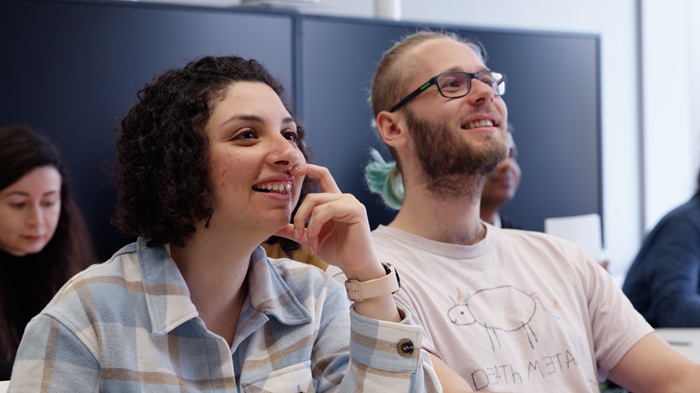Bavaria's Minister of Science Markus Blume announced today in Munich: "Our Elite Graduate Programs offer triple excellence: excellent scientists train excellent students under excellent conditions. Bright minds are our most valuable resource. With the four new Elite Graduate Programs at the universities in Bayreuth, Erlangen-Nuremberg, Munich, and Würzburg, we are sending a strong signal: we support the best—and we challenge them to take responsibility, think creatively, and tackle new things. This creates networks, ideas, and innovations that have an impact far beyond any campus. Many thanks to the universities for their outstanding concepts. The new degree programs are more than just academic programs—they are think tanks for the future of our society."
Innovative topics and individual support
The new graduate programs designed by the universities were reviewed in a science-led process by the International Commission of the Elite Network chaired by Prof. Dr. Peter Strohschneider, former chair of the German Council of Science and Humanities and former president of the German Research Foundation (DFG), and by external expert committees. Subsequently, they were recommended for funding by the Bavarian Ministry of Science.
All recommended applications met the criteria for Elite Graduate Programs to the highest degree. In addition to the excellence of the participating scientists, the innovative subject areas, and the high academic standards, it is particularly the outstanding individual support, modern teaching and learning methods, and extensive additional offerings that make Elite Graduate Programs highly attractive to particularly talented students. Future students are selected through a transparent and performance-based selection process at the respective university.
Membership in the Elite Network gives students in Elite Graduate Programs access to not only outstanding academic training but also extensive non-material support: from soft skill seminars and a wide variety of networking events to events organized by our partners, such as the Academy for Political Education in Tutzing or the Lindau Nobel Laureate Meeting.
The four new Elite Graduate Programs in detail:
- “Ecological Forecasting”, University of Bayreuth with JMU Würzburg
The program focuses on predicting and modeling the effects of global change on environmental systems. This gives the program a unique profile in Germany and provides expertise in a field of research that is hugely relevant for the future. The program fits perfectly into the profile of the University of Bayreuth. With JMU's expertise in the fields of AI and statistics and the involvement of non-university partners such as the German Aerospace Center (DLR) and the Bavarian Forest National Park, effective interdisciplinary links are created.
Spokespersons: Prof. Dr. Steven Higgins (Bayreuth), Prof. Dr. Tobias Ullmann (Würzburg)
- “Emerging Educational Technologies for Science Technology Engineering Mathematics”, JMU Würzburg
The digital transformation in education will require experts who combine technological expertise, subject-specific teaching knowledge, and teaching practice. The master's program combines technological content with subject-specific teaching approaches, thus creating a sought-after qualification profile. It is aimed at students studying to become teachers of STEM subjects as well as students of computer science-related programs, and this interconnection opens up new perspectives for both sides: Students studying to become teachers gain insight into software development processes and modern AI-supported learning environments, while computer science students develop a deeper understanding of didactics and can position themselves in a dynamically growing digital education market by developing their own unique profile. Thanks in part to renowned cooperation partners such as the Israel Institute of Technology, the FU Berlin, and C.C. Buchner Verlag, this is a flagship project that can set standards nationwide.
Spokesperson: Prof. Dr. Thomas Trefzger (Würzburg)
- “AI in Biomedicine”, TU Munich mit FAU Erlangen-Nuremberg
The use of artificial intelligence accelerates biomedical discoveries and the development of new therapies and devices. This offers enormous potential for the pharmaceutical and medical device industries. The program aims to train students to become AI experts who drive innovation in biomedicine and healthcare. Ethical issues surrounding the use of AI are also addressed. Science, industry, and clinical fields all have a great need for specialists in this highly interdisciplinary field. Highly renowned cooperation partners include Harvard Medical School, ETH Zurich, the University of Oxford, Amazon, Google, IBM Germany, Siemens Healthineers, and Carl Zeiss.
Spokespersons: Prof. Dr. Daniel Rückert (Munich; Gottfried Wilhelm Leibniz Prize 2025), Prof. Dr. Andreas Maier (Erlangen)
- “Earth System Dynamics and Evolution”, FAU Erlangen-Nuremberg mit University of Bayreuth
The program examines the complex interactions between the atmosphere, biosphere, geosphere, and hydrosphere. The focus is therefore on the entire earth system, with the aim of being able to predict and manage environmental processes. Using state-of-the-art methods and technologies from the field of data science, analogies between environmental events from the distant past and possible future scenarios are examined. In addition, the program places further emphasis on “science diplomacy” – understanding the political and diplomatic dimensions of environmental change. This highly interdisciplinary approach gives the program a unique selling point throughout Europe.
Spokespersons: Prof. Dr. Rachel Warnock (Erlangen), Prof. Dr. Barbara Kleine-Marshall (Erlangen)
Text: Bavarian State Ministry of Science and the Arts


